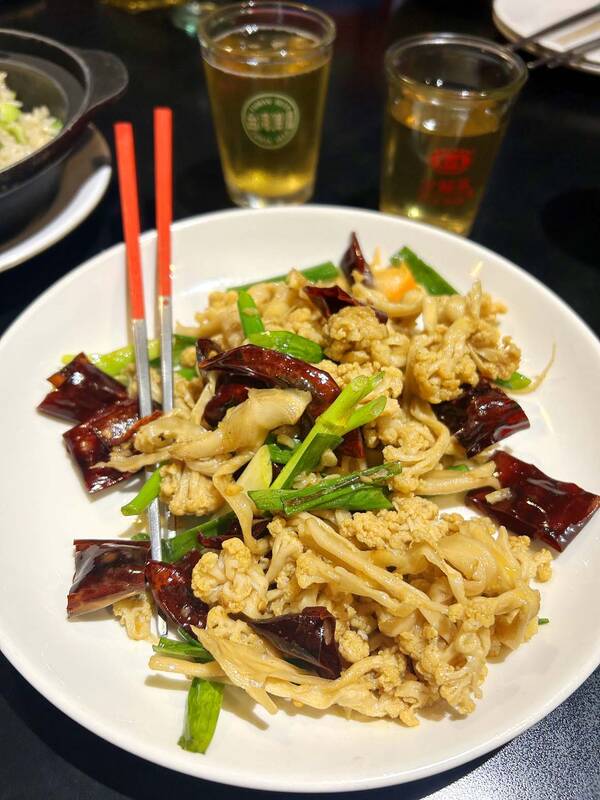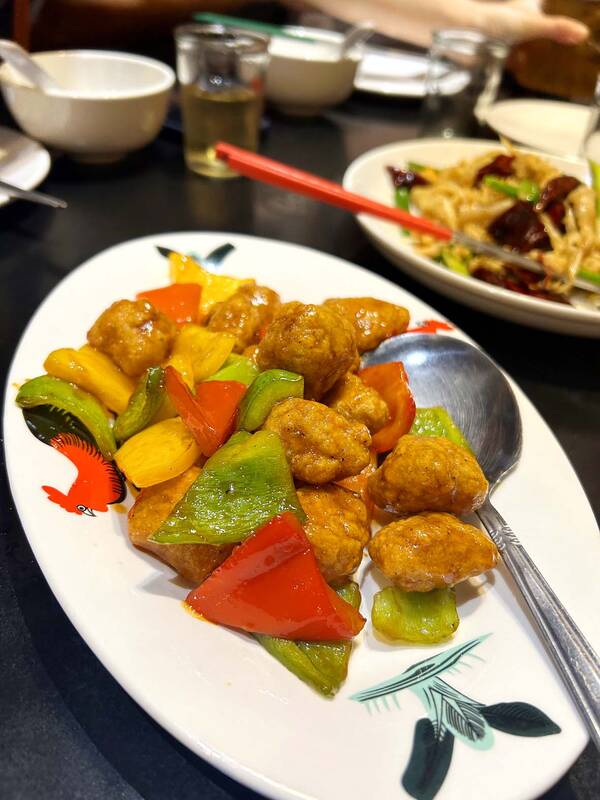If anyone has said being vegan in Taipei is easy, they’re either lying or loaded. Night markets can become a sad affair of grilled mushrooms and sweet potato balls. Yes, Taiwanese eateries will offer vegetable side dishes, but be sure to hold the pork, and at cafes, asking for oat milk is a roll of the dice.
Vegetarian-only eateries range from the basic Buddhist buffet to the expensive Western bistro, but rarely offer something in between. Enter Chao.
Everything about Chao (炒炒新亞洲蔬食) mirrors the conventional stir-fry experience, known locally as rechao (熱炒). Dim lights and rowdy crowds, the chinking of beer glasses and chopstick battles for the last shrimp ball. Diners dig into steamed chili cod, Taiwanese sausages and Teppanyaki beef platters. But here’s the catch: none of the food at Chao contains any animal products.

Photo: Hollie Younger
I’ll be the first to admit, Taiwan has reawakened my inner carnivore. But my circle of friends keeps me flexitarian-curious and I’ll forever be fascinated by vegan creations: how does modern alchemy recreate flaky fish from fungus?
Sometimes the innovative flair of a vegan restaurant can elevate the food to that next level, and Chao is the city’s best example of how vegan eateries can be exciting to everyone, while affordable, authentic and accessible to non-vegans.
I gather a six-strong crowd of locals and foreigners, meat-eaters and meat haters alike, for a Monday night feast. Reservations are required in advance, even on weeknights.

Photo: Hollie Younger
Tucked behind the busy streets of Zhongxiao East Road, red lights guide us down a quieter alleyway to an up-scale rechao spot with the iconic chao (炒) in neon lights.
We get started with a round of Taiwan Gold Medal beers and opt for the four person set menu with an extra order of rice. The menu may look intimidatingly broad but the top 10 dishes are advertised for easy ordering.
First up, the crispy fried “oysters” (NT$200) win the award for most realistic mock meat. Served classic Taiwanese style with a peppery seasoning and fried basil leaves, the interior, perhaps comparable to a chewy dough, almost had me fooled.

Photo: Hollie Younger
The pineapple shrimp balls (NT$350) are also almost unidentifiably vegan. A classic yet confusingly sweet stir-fry dish of crispy battered balls with condensed milk coating and, if lucky, a smattering of birthday cake sprinkles. Not only the texture but the shrimp flavor could fool even the best of us.
My personal favorite would be the Nyonya “fish” curry (NT$350). How they create such realistic hunks of glistening, flaky white fish is a mystery to me. Chao has their imitation seafood down pat. This Chinese-Malay fusion curry was creamy and cooling enough to balance our red-hot side dishes — the pickled Sichuan pepper and tofu (NT$200) has brought tears to our eyes.
But it’s the Teppanyaki sizzling beef (NT$280) that finishes the night with a touch of drama; a roaring hot plate of steaming “beef” medallions and caramelized onions with a strong hit of black pepper. The beef texture had chewy and tender layers just like the real deal, with the punchy sauce just masking the inevitable mushroom flavor of most mock meats.

Photo: Hollie Younger
Overall, nothing in my carnivorous soul craved the original. We shared dishes family-style, enjoying local flavors and laughter until 11pm when the last beer was empty. My vegan and vegetarian friends were truly grateful for an experience that felt authentic and inclusive.
In a city where meat is king, Chao proves that even the most dedicated carnivores can find joy in plant-based dining, a health and environmentally conscious choice for us all.
Now watch this space for my next review, featuring Taiwan’s award-winning beef noodle soup.

Behind a car repair business on a nondescript Thai street are the cherished pets of a rising TikTok animal influencer: two lions and a 200-kilogram lion-tiger hybrid called “Big George.” Lion ownership is legal in Thailand, and Tharnuwarht Plengkemratch is an enthusiastic advocate, posting updates on his feline companions to nearly three million followers. “They’re playful and affectionate, just like dogs or cats,” he said from inside their cage complex at his home in the northern city of Chiang Mai. Thailand’s captive lion population has exploded in recent years, with nearly 500 registered in zoos, breeding farms, petting cafes and homes. Experts warn the

No one saw it coming. Everyone — including the Chinese Nationalist Party (KMT) — expected at least some of the recall campaigns against 24 of its lawmakers and Hsinchu Mayor Ann Kao (高虹安) to succeed. Underground gamblers reportedly expected between five and eight lawmakers to lose their jobs. All of this analysis made sense, but contained a fatal flaw. The record of the recall campaigns, the collapse of the KMT-led recalls, and polling data all pointed to enthusiastic high turnout in support of the recall campaigns, and that those against the recalls were unenthusiastic and far less likely to vote. That

The unexpected collapse of the recall campaigns is being viewed through many lenses, most of them skewed and self-absorbed. The international media unsurprisingly focuses on what they perceive as the message that Taiwanese voters were sending in the failure of the mass recall, especially to China, the US and to friendly Western nations. This made some sense prior to early last month. One of the main arguments used by recall campaigners for recalling Chinese Nationalist Party (KMT) lawmakers was that they were too pro-China, and by extension not to be trusted with defending the nation. Also by extension, that argument could be

Aug. 4 to Aug. 10 When Coca-Cola finally pushed its way into Taiwan’s market in 1968, it allegedly vowed to wipe out its major domestic rival Hey Song within five years. But Hey Song, which began as a manual operation in a family cow shed in 1925, had proven its resilience, surviving numerous setbacks — including the loss of autonomy and nearly all its assets due to the Japanese colonial government’s wartime economic policy. By the 1960s, Hey Song had risen to the top of Taiwan’s beverage industry. This success was driven not only by president Chang Wen-chi’s